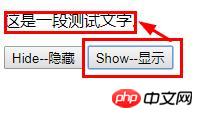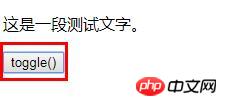
How does jquery implement the hiding or displaying effect of elements? This article will introduce to you how to set the hiding or display of elements in jquery, so that you can understand the method to achieve the switching effect of hiding and displaying elements. It has certain reference value. Friends in need can refer to it. I hope it will be helpful to you.
There are two ways to implement element hiding and display effects in jquery, which are:
1. Use the hide() and show() methods to hide and display elements
2 , Use the toggle() method to hide and show elements
Let’s take a look at how these two methods implement the hiding and display of elements.
hide() and show() methods implement hiding and displaying elements
jquery’s hide() method is used to hide elements
jquery's show() method is used to display elements
Rendering:

Click the hide button to use the hide() method. Hidden elements:
# Click the show button, you can use the show() method to display the hidden elements:

toggle() method implements hiding and displaying elements (switching between hiding or displaying)
toggle() method can switch the visible state of elements, that is: switching elements to hide or show.
The toggle() method will determine whether the elements are hidden or displayed. If the selected elements are visible, these elements will be hidden. If the selected elements are hidden, these elements will be displayed.
Rendering:

Note: Using the jquery method, whether it is hide(), show(), toggle(), or other methods, all You must first reference the jquery.js file.
Summary: The above is the entire content of jquery to implement the hiding or displaying effect of elements. The code is very simple, and you can try it yourself at the cost. I hope it will be helpful to everyone's learning. For more related tutorials, please visitjQuery Video Tutorial,JavaScript Video Tutorial,bootstrap Video Tutorial!
The above is the detailed content of How jquery implements the hiding or displaying effect of elements (code example). For more information, please follow other related articles on the PHP Chinese website!